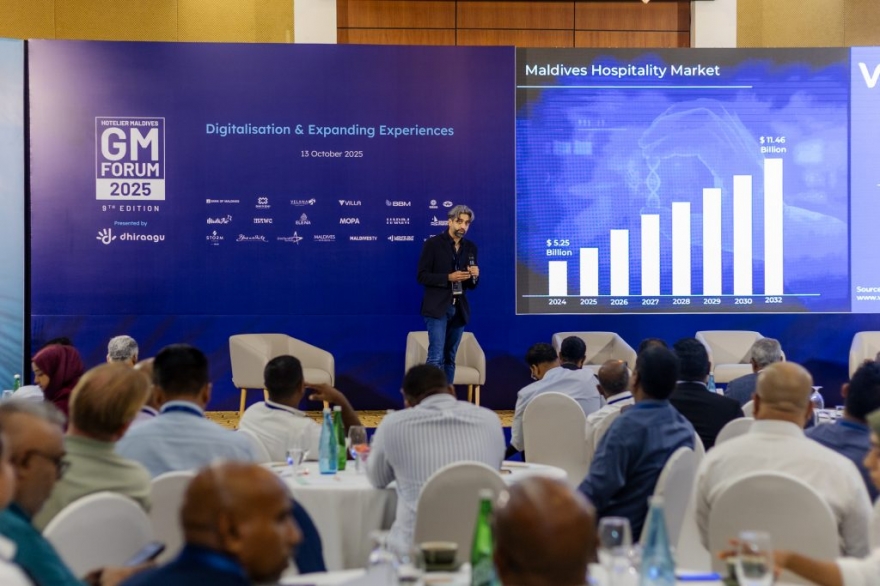
At the 2025 Hotelier Maldives General Managers (GM) Forum, Abubakar Latif, Chief Technology Officer at Beyon Cyber and Board Member of DTS Solutions UAE, delivered a compelling reminder that the future of hospitality depends not only on innovation and guest experience — but also on digital trust. In his presentation titled “A Stakeholder Analysis of Cyber Risks in the Hospitality Industry,” Latif explored how the rapid digital transformation sweeping through tourism has brought unprecedented vulnerabilities, urging resort leaders to treat cybersecurity as a shared, strategic responsibility.
Addressing an audience of industry pioneers, policymakers, and resort executives, Latif began on a light-hearted note. “It’s my third time in the Maldives,” he said with a smile. “My daughter isn’t very happy about my visit this time because I came without her. She absolutely loves this place.” His warmth quickly gave way to a sobering message about the scale of digital exposure in one of the world’s most connected tourism industries. “We are entering an era defined by CAMRIC — Cloud, Artificial Intelligence, Mobility, Big Data, Robotics, and the Internet of Things — and tying it all together is cybersecurity,” he explained. “The challenge is not just to innovate, but to protect.”
He reminded delegates that tourism accounts for roughly 30 percent of the Maldivian economy and employs close to 40 percent of the national workforce. “With the sector expected to double its economic contribution in the next five years, driven largely by digital experiences, we must acknowledge that every new digital touchpoint — every booking system, payment gateway, or smart lock — is also a potential point of vulnerability,” he said.
Drawing from years of cybersecurity experience across the Middle East and beyond, Latif revealed how the hospitality sector has become one of the most targeted industries for cyberattacks. “One in three businesses in hospitality has experienced a data breach,” he noted. “And nearly 89 percent of those organisations were attacked again. The average cost of a breach today is around USD 3.4 million, and that doesn’t include the long-term costs of reputation loss or guest trust.”
He recounted a striking example from Austria, where a ransomware attack trapped guests inside their hotel rooms after hackers took control of the smart locking system. “That property was attacked three times in a single year,” Latif said. “Eventually, they decided to return to traditional keys. It’s ironic — the same technology designed to improve efficiency ended up undermining guest confidence. That’s the true cost of neglecting cybersecurity.”
Latif linked these risks to the Maldives’ own Fifth Tourism Master Plan, which identifies digital transformation as a central pillar of national growth. “Goal number ten calls for 360-degree digitalisation — expanding fibre connectivity and introducing smart tourism services,” he said. “But it also recognises the need for legal frameworks to combat cybercrime and ensure safe electronic transactions. This is the right approach: transformation must rest on a secure foundation.”
He walked the audience through the evolution of major cyberattacks in the hospitality world — from global hotel chains in 2008 and 2014 losing millions of customer records, to the infamous 2018 breach that compromised over 500 million guest profiles. “These are not isolated events,” he warned. “When a hotel loses personal data — passports, credit cards, identities — it’s not something that can be recovered. Within hours, that data is replicated across the internet. The reputational damage is permanent.”
Looking ahead, Latif warned of a new era of AI-driven attacks capable of executing faster and more complex breaches. “In the past, cyberattacks unfolded over days. Now, thanks to artificial intelligence, they can begin and end in under 14 hours. In some cases, under seven minutes,” he said. “The very technology we use to improve service can also be used to exploit us.” He cited an example of a 157-year-old British university that was forced to shut down after a ransomware attack, remarking that “it survived two world wars but couldn’t survive ransomware. That’s how real this threat has become.”
Latif outlined the growing range of risks facing modern resorts — from compromised Wi-Fi networks and hacked point-of-sale systems to manipulated smart devices and autonomous service robots. “Imagine an intelligent machine or digital concierge that’s been hacked,” he said. “It’s not just a technical issue anymore — it becomes a safety issue. As we connect more devices and automate more services, our risk increases exponentially.”
Despite the sobering statistics, his message was not one of fear, but of preparedness. “The good news is that we can manage these risks,” he assured the audience. “The first step is awareness. People are often the weakest link. Most ransomware attacks happen because of unpatched systems or human error.” He urged resort leaders to embed cybersecurity awareness at every level of their organisation, keep systems updated, encrypt sensitive data, limit access rights, and maintain regular backups. “Think beyond the firewall,” he said. “In the digital age, identity and data are your true assets. Protect them.”
As his session drew to a close, Latif left the audience with a clear takeaway — that cybersecurity is now integral to guest experience and brand reputation. “In a world where digital experiences define luxury and service, trust is your ultimate differentiator,” he concluded. “Cybersecurity isn’t just about defending systems. It’s about protecting your guests, your reputation, and the promise of paradise itself.”
Launched in 2016, the Hotelier Maldives GM Forum has become a cornerstone event for the country’s tourism industry. Each edition brings together general managers, resort owners, developers, and senior executives to share insights, exchange ideas, and discuss strategies for innovation and collaboration.
The 2025 Forum, held on 13 October 2025 at Kurumba Maldives, once again convened leaders from across the Maldives’ hospitality sector to discuss digital transformation, sustainability, human capital, financing, and long-term competitiveness — reaffirming its role as the premier platform for thought leadership in the industry.
Partners and sponsors of GM Forum 2025 include:
Please login to Comment